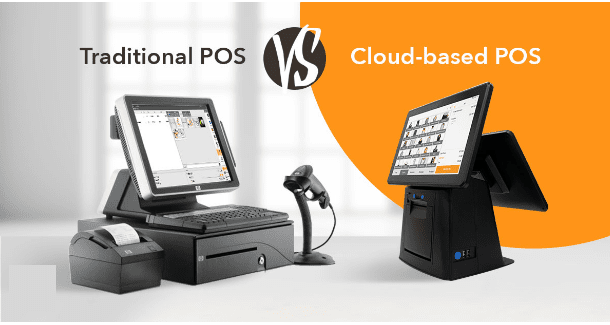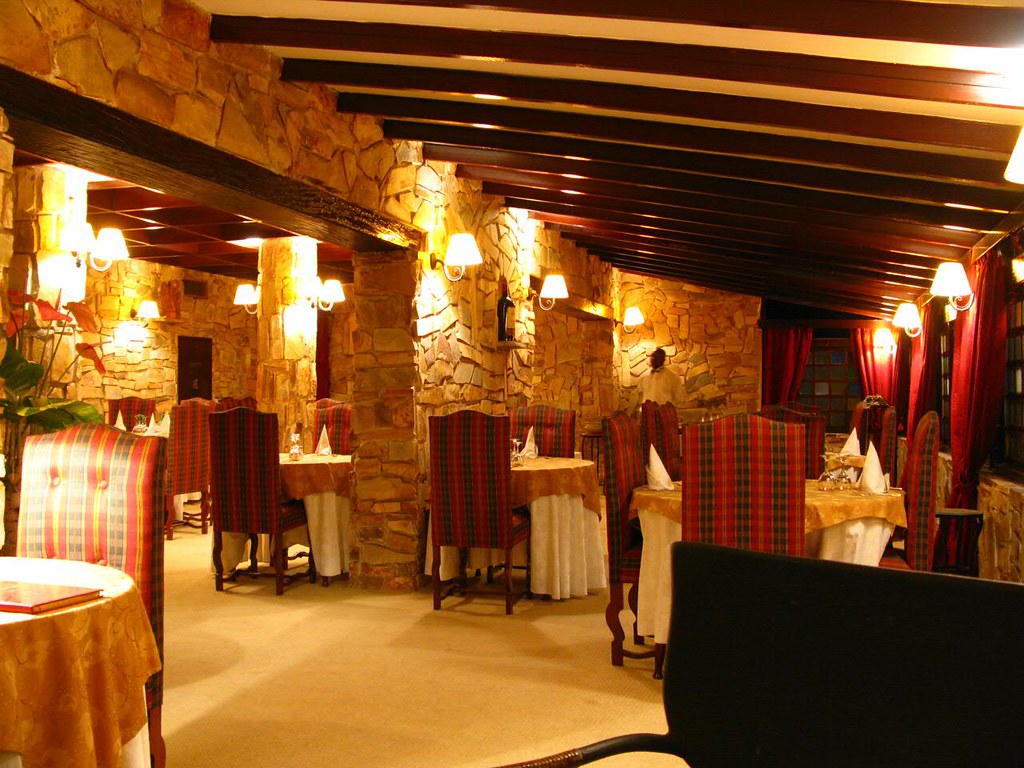Cloud vs Traditional Restaurant POS System- Which One is Better & Why?

Running a restaurant business requires juggling multiple tasks and responsibilities. One of the most crucial decisions a restaurant owner has to make is choosing the right point of sale (POS) system.
With the advent of technology, traditional POS systems have been replaced by cloud-based POS systems that offer more advanced features and functionalities.
But does that mean traditional POS systems are obsolete? In this blog post, we will explore the pros and cons of cloud vs traditional restaurant POS systems to help you decide which is better for your business.
So if you’re a restaurant owner looking for the perfect POS system, keep reading.
Understanding the Basics of Restaurant POS Systems
Restaurant POS systems are essential tools for any restaurant business. They help streamline operations, manage inventory, and improve customer service.
A POS system combines hardware and software that allows restaurants to process transactions, manage orders, and track sales. There are two types of restaurant POS systems: cloud-based and traditional.
A cloud-based restaurant POS system is a web-based software that operates on remote servers and can be accessed online. It allows restaurant owners to manage their business from anywhere, anytime, using any device with an internet connection.
On the other hand, a traditional restaurant POS system is an on-premise software that operates on local servers and can only be accessed from within the restaurant.
Choosing between a cloud-based or traditional POS system depends on several factors such as budget, business size, and specific needs.
In this article, we will compare the features and benefits of both POS systems to help you make an informed decision.

What is a Cloud Restaurant POS System?
A cloud restaurant POS system is a point-of-sale system that operates on cloud-based servers rather than traditional on-premise servers. This means all data is stored and processed on remote servers accessed online.
Cloud POS systems are designed to be accessible from any device with an internet connection, including smartphones and tablets. They offer a range of features, such as inventory management, employee scheduling, and real-time reporting.
One of the most significant advantages of a cloud POS system is its scalability, as it can easily be expanded to accommodate growing businesses. Additionally, cloud POS systems offer enhanced security features such as automatic backups and encryption to protect sensitive data.

Features and Benefits of a Cloud Restaurant POS System
A cloud restaurant POS system is software that runs on the Internet and can be accessed from any device with an Internet connection.
It offers various features such as real-time inventory management, menu customization, and sales reporting. One of the most significant benefits of a cloud POS system is its flexibility.
Restaurant owners can access their data from anywhere, anytime, and make changes to their menu or pricing in real time. Cloud POS systems are typically more affordable than traditional systems since they don’t require expensive hardware or maintenance costs.
Another advantage is that cloud POS systems offer automatic software updates that ensure the system is always up-to-date with the latest features and security patches.
What is a Traditional Restaurant POS System?
A traditional restaurant POS system is a software that runs on a physical server within the restaurant’s premises. This type of POS system requires separate hardware like monitors and printers to function seamlessly.
Traditional POS systems offer more control over data and its security as it is all stored locally in-house. Additionally, they can process transactions even when there is no internet connectivity.
However, traditional restaurant POS systems have limitations, such as slow operation speed and expensive maintenance costs for hardware replacements or upgrades. It also lacks remote accessibility, making tracking sales figures difficult during offsite operations.
In summary, traditional Point Of Sale (POS) systems are suitable for restaurants that prioritize complete control over their technology with reliable performance but do not require mobility and flexibility compared to cloud-based alternatives.

Features and Benefits of a Traditional Restaurant POS System
Traditional restaurant POS systems are built on legacy technology that many restaurants still use. These systems typically require a server or a central computer to run the software; sometimes, they may be limited to a single terminal.
However, traditional POS systems offer certain benefits, such as stability and reliability, since the data is stored locally on the system rather than in the cloud.
Another benefit of traditional POS systems is their cost-effectiveness. They tend to have lower upfront costs than cloud-based solutions, often requiring additional hardware and subscription fees.
Traditional POS systems offer better control over sensitive data like customer information since it’s securely stored within your network.
On the downside, these systems can be difficult to upgrade or manage remotely since they rely heavily on physical connections.
Additionally, because they store all data locally, there’s always the risk of losing important information due to theft or equipment failure. Hence, regular backups are critical for this type of setup.
Comparison between Cloud vs Traditional Restaurant POS Systems
Several factors must be considered when choosing between a cloud-based and traditional restaurant POS system.
One of the main differences is the cost, as cloud-based systems typically have lower upfront costs and require less hardware.
Additionally, cloud-based systems offer more flexibility and accessibility, as they can be accessed from anywhere with an internet connection.
On the other hand, traditional POS systems offer more stability and reliability, as they do not rely on an internet connection.
They also offer more customization options and can be tailored to specific restaurant needs.
Another key difference is in terms of updates and maintenance. Cloud-based systems typically receive automatic updates and require less maintenance, while traditional systems may require manual and regular maintenance.
Ultimately, the choice between a cloud-based or traditional POS system depends on each restaurant’s specific needs and priorities.

Factors to Consider When Choosing Between Cloud & Traditional Restaurants Point Of Sale (POS) Systems
Choosing between cloud and traditional restaurant POS systems can be tough, as both have advantages and drawbacks.
Some critical factors to consider include cost, ease of use, scalability, security features, hardware requirements, customer support, data backup options, and customization abilities.
Cloud-based systems are known for their low upfront costs and easy setup process, while traditional POS systems offer more granular control over settings and provide better offline capacity.
It’s also important to assess whether your restaurant has stable internet connectivity, as cloud-based systems rely heavily on it.
When weighing your options between the two types of POS solutions, consider your current needs and how business may change.
Overall, many independent restaurants find that a cloud-based POS system provides them with everything they need – from sales tracking to inventory management – without breaking the bank or making it difficult for staff members to learn new processes.

Case Studies: Success Stories from Restaurants that Switched to Cloud or Stayed with Traditional Point Of Sale (POS) system.
Many restaurants have found success using both cloud and traditional POS systems. Restaurant A, a quick-service restaurant in New York City, improved its ordering process by switching to a cloud POS system. The system allowed them to customize orders and track inventory in real-time easily.
On the other hand, Restaurant B, a fine dining establishment in Chicago, experienced minimal downtime and had complete control over its data by sticking with a traditional POS system.
However, it’s important to note that external factors such as internet connectivity can impact the performance of cloud-based systems. Some restaurants may also prefer the simplicity of traditional cash registers.
Ultimately, it’s up to individual restaurant owners to weigh the pros and cons of each type of system before deciding which one is best suited for their establishment’s unique needs.

Conclusion: Cloud vs Traditional Restaurant POS Systems Which One Is Better? The Final Verdict
After analyzing the features, benefits, and factors to consider, it’s clear that cloud restaurant POS systems have the upper hand over traditional ones.
The flexibility, scalability, and accessibility of cloud POS systems make them a better fit for modern restaurants.
Cloud POS systems allow restaurant owners to access real-time data from anywhere, which helps them make informed decisions. They also offer more advanced features like inventory management and online ordering.
Additionally, cloud POS systems are more cost-effective in the long run as they eliminate the need for expensive hardware upgrades and maintenance.
While traditional POS systems may work for some restaurants, it’s clear that cloud POS systems are the future of restaurant technology.
In conclusion, both cloud and traditional restaurant POS systems have their unique features and advantages. The decision to choose between them ultimately comes down to the specific needs of each restaurateur.
If you’re a small business owner or startup with limited resources, a cloud-based point-of-sale system may be your best bet due to its affordability and scalability.
On the other hand, if you run a large chain operation with complex operations that require on-premise solutions, traditional POS systems might work better for you.
However, evaluating factors such as budget constraints, customization options, customer support services, security requirements, and user interface design is essential when choosing.
While cloud-based restaurant POS systems offer more flexibility in terms of payment processing and data accessibility from anywhere in the world, they are not suitable for businesses that require heavy-duty hardware like printers or cash drawers since they lack direct integration capabilities.
In summary, the decision to choose either Cloud vs Traditional Restaurant Point-Of-Sale (POS) System depends
FAQS
Who benefits from using a cloud-based POS system for a restaurant?
Restaurant owners who want remote access, easy updates, and lower upfront costs.
What is the difference between a cloud-based and traditional POS system?
A cloud-based POS system is internet-based, while a traditional system is locally installed.
How can a cloud-based POS system improve a restaurant’s operations?
By streamlining orders, inventory management, and sales reporting in real-time.
What are the potential drawbacks of a cloud-based POS system?
Possible internet connectivity issues, data security concerns, and reliance on third-party servers.
How does a traditional POS system compare to a cloud-based system in terms of cost?
Traditional systems often require higher upfront costs, while cloud-based systems offer more flexible pricing options.
What if a restaurant already has a traditional POS system in place?
They can consider hybrid solutions that integrate cloud-based features or gradually transition to a cloud-based system.
Jeff Smith is a Restaurant Consultant with over 20 years of hospitality experience ranging from server to owner and general manager. He focuses on Restaurant POS technology as well as restaurant marketing. Make sure to check out our world famous restaurant resources resources page for a comprehensive offering of hand picked resources and tools to help your business. You can also check out some of our other restaurant business articles.
